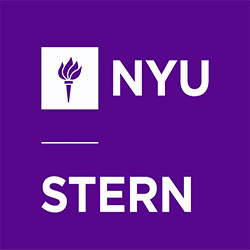 Omotoke is a recent Tech MBA graduate with specializations in Strategy & Business Analytics. Prior to Stern, Omotoke worked with KPMG as a Technology Assurance Consultant and is now looking to pursue Technology Risk & Strategy Consulting. At Stern, she was on the Board of the Association of Hispanic & Black Business Students and a member of the Management Consulting Association. Omotoke enjoys listening to good music and attending dance classes.
Omotoke is a recent Tech MBA graduate with specializations in Strategy & Business Analytics. Prior to Stern, Omotoke worked with KPMG as a Technology Assurance Consultant and is now looking to pursue Technology Risk & Strategy Consulting. At Stern, she was on the Board of the Association of Hispanic & Black Business Students and a member of the Management Consulting Association. Omotoke enjoys listening to good music and attending dance classes.
It’s graduation week as I write this, and nostalgia has begun to creep up on me. I have really enjoyed a great time since I arrived in New York from Nigeria a year ago to start my MBA. As I think back on the year-long experience that now feels like only a few weeks, these are tips I would give a prospective or newly admitted student.
1. Start your visa application immediately
Backstory– I got my admission offer in January 2022, but as of May 2022, one week from orientation, I was yet to secure a visa interview appointment – let alone a visa. Even though I already resigned from my job for school, it didn’t seem like I was going anywhere 😅.
By divine providence, in that final week, I was called to interview. I finally received the visa, one day behind the official resumption for International Students. I hurriedly packed and made the 20+ hour trip within the next two days. You can imagine the rollercoaster this was, yet the saddest part was having no time to say goodbye to all my loved ones in person.
There are not many things I could have done differently in my case; however, securing my admission in round 1 instead of round 2 probably may have saved me the headache. So, if that is what it will take for you to get your visa ahead of time, by all means apply in round 1.
Along the same lines, if you want your family or other guests present at graduation, start their visa applications very well ahead if they are from countries with long wait times. I started making arrangements for my parents’ graduation trip 3 months ahead and by then it was too late.
2. Ensure you’re capturing all the important expenses in your budget planning
No one forgets rent, food, entertainment, utilities etc. but two expenses I find can be easily omitted are: loan interest repayments and co-curricular/leisure travel expenses.
Private loans are often very helpful for international students to cover some of their cost of attendance; however, a common oversight is to not plan interest repayments into estimated monthly budgets. Some forget this expense and some assume that it would be trivial.
Depending on your loan amount and terms, it may not be trivial, and you may need to start making payments early on. Get your estimates and factor it into your monthly budget and estimated cost of living.
Next, travel! You need to have a budget for travel. There will be lots of travel opportunities for coursework and for leisure with your classmates; planning ahead for this will allow you to take on these great experiences without much pressure.

Additional tip: Request and review the school calendar for the year before starting the program to note the school holidays and make your own holiday plans.
3. Pack the right outfits
I wish someone whispered to me in the middle of my frantic packing, “Toke, you’re packing all the wrong clothes.”
I remember being unsure about how formal I would need to dress for classes and eventually settling for business based on my quick Google search. I brought in work clothes and a number of pumps…haha, but it only took a day or two to know the pumps were going back into the box.
There’s a lot of flexibility around the dress code for classes. You can be as formal as you would like but you’ll find most people dressed in smart casuals. There will be company visits, corporate presentations and interviews, for which you could be required to be more formally dressed.
Pack accordingly and whatever you do, make sure your shoes are “subway and walking friendly” because you can’t miss those.
4. Start preparing for recruiting from Day 1
Depending on your target, recruiting activities may kick off really early in the programme, with applications opening in June/July and interviews rolling in by August.
As part of your early preparation, my recommendation is to make a long list of companies (not three or five) within your target industry that do not have a permanent work authorization hiring requirement (if you are an International student within this category) and get the timing of their recruitment.
While many companies hire on a rolling basis, some have specific times of the year when they do MBA recruitment and missing that window could mean waiting another 6-12 months.
Making this list upfront helps you identify many prospects and pace your interview preparation. Stern has very helpful databases for this research on the Careers Portal gathered from previous years. The Careers team will be ready to help you when you arrive, but it’s nice to begin planning ahead anyway.
5. The communities really want to be helpful, ask for all the help you need
You’ve heard how fantastic the NYU clubs are 99 times already so I’ll try not to make it a hundred. The recommendation I have here is to join at least one, very early, before you travel down, if possible. You would be unable to register as an “official” member until the clubs open up for admissions in Fall but you could join the Whatsapp groups of some affinity clubs anytime after you accept your admission offer. Joining before you travel down will allow you leverage the community for the help you need with onboarding, settling in, temporary accommodation, renting, finding housemates, choosing courses and all the initial hard stuff.
So find a community, join, and ask for whatever help you need. Sternies are always willing.
As a final note, immerse yourself and enjoy the diversity of NYU and New York. You will do great.






















































